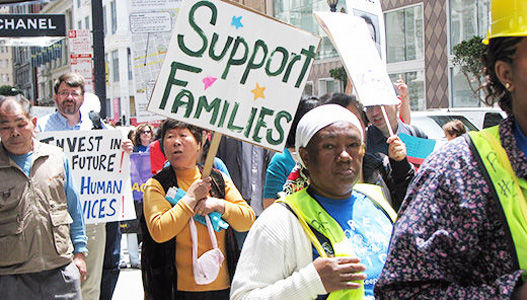
WASHINGTON (PAI) – John Kline, the Republican who will take over the House Education and Labor Committee next year, hates the Employee Free Choice Act and opposes tougher penalties for job safety and health violations.
According to a review of his statements, the representative from a district south of Minnesota’s Twin Cities will be dubious to hostile towards causes pushed by workers and their unions. The AFL-CIO’s 2010 legislative scorecard said Kline went 0-for-12 on votes on the labor federation’s top issues so far this year.
Kline is the top Republican on the committee, which for years has been one of the most-polarized in Congress. Present chairman George Miller, D-Calif., leads its pro-worker Democrats. Its GOP contingent is heavily pro-business. Some of its Southern Republicans are virulently anti-union.
Kline, a close ally of incoming Speaker John Boehner, R-Ohio, is no fan of the Employee Free Choice Act. Kline also opposes project labor agreements for federal construction and the new majority-of-those-voting rules for airline and railroad workers seeking union recognition, rules promulgated by the National Mediation Board.
“There’s nothing free about it, there’s no choice about it. It is one of the biggest misnomers in all of government,” Kline says of EFCA, which never came up for a vote this year in the House panel. Miller was waiting for the Senate to pass it first.
But Senate Labor Committee Chairman Tom Harkin, D-Iowa – who will hold that post in the next Congress – never got the 60 votes he needed to stop a planned Senate GOP filibuster against it. It had been labor’s top specific legislative cause.
That didn’t stop Kline from raising the specter of congressional passage of the Employee Free Choice Act sometime between now and Jan. 3, when the GOP takes over the House – and he takes over the House panel.
In typical Republican language, Kline declared in an August op-ed that one key provision, “‘card check,’ would replace a secret ballot election with a public sign-up process for workers deciding whether to join a union. As a result, the bill would drive up costs on business, increase workplace conflict, and lead to fewer jobs…Just yesterday, President Obama promised labor bosses [sic] he would remain in the fight to pass card check.” Kline worried that labor would try to enact EFCA in the current lame-duck session of Congress.
His priorities will be very different, Kline said the day after the election gave the GOP House control, on Jan. 3 and for the next two years. “Because quality schools are essential to our economic strength, our efforts will include an emphasis on education reform to ensure all students have the opportunity to thrive in the 21st century,” he said.
That doesn’t mean renewing GOP President George W. Bush’s No Child Left Behind education law, Kline said earlier. He wants a “top-to-bottom review” of it because he believes Bush’s law produces too much federal control of local schools.
His other top priorities for the panel are: “Giving employers the certainty, flexibility, and freedom to create jobs, conducting robust oversight of education and workforce programs … “
Kline was also dead set against improving the Occupational Safety and Health Act, which has changed little since it was approved in 1970. Its fines are still low and if a job safety accident kills a worker, the employer can only be cited for a misdemeanor.
Workers and unions – and survivors of workers who died on the job – argued for higher fines, tougher enforcement and making deaths on the job felonies punishable by years in jail. So did the Obama administration. Kline says “no.”
“Proposed changes to the OSH Act…will drive up costs and litigation for employers – all of which would make it more difficult to create jobs when our economy needs them most,” he said at a hearing.
Mine safety is another matter. Kline – and other panel Republicans – felt another mine safety law was not the answer to the Upper Big Branch coal mine blast earlier this year. His solution was more enforcement and targeting the “bad applies.”
“Cecil Roberts, the head of the Mine Workers, testified 95% of mine operators are trying to do the right thing, but some small number of bad actors are flouting the law,” Kline said at that same hearing. “This is unacceptable.
“The Department of Labor’s Inspector General confirmed what MSHA itself told us: The agency never enforced the law to its fullest extent. This, too, is unacceptable. Both of these breakdowns in the system must be addressed. But neither can be solved with legislation alone. Tougher laws do us no good if bad actors are permitted to flout the law and federal authorities choose not to enforce it. Changes to sharpen the tools in MSHA’s toolbox can prod the agency to step up its enforcement,” he added.
Photo: PW/Marilyn Bechtel












Comments